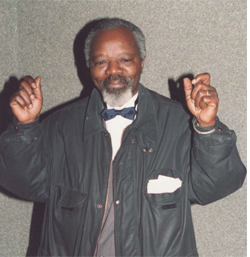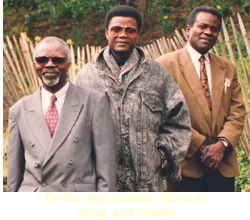|
 Essous, Jean Serge "Trois S," distinguished Congolese saxophonist and band leader; born Mossendjo, Congo-Brazzaville, Jan. 15, 1934; died Brazzaville, Nov. 25, 2009. Essous, Jean Serge "Trois S," distinguished Congolese saxophonist and band leader; born Mossendjo, Congo-Brazzaville, Jan. 15, 1934; died Brazzaville, Nov. 25, 2009.
One of the principal artists of Congolese pop music's modern era, Essous first learned to play a small reed pipe, called pipeau in French, in a Brazzaville Boy Scout troop. He graduated to clarinet and, together with saxophonist Nino Malapet and singers Edo Ganga and Célestin Kouka, formed the band Negro Jazz near the end of 1954. Band eventually crossed the Congo River to Kinshasa (Léopoldville) where Essous signed with the Loningisa recording studio. In 1956, he became a founding member and the first chef d'orchestre of O.K. Jazz.
The following year Essous moved to the Esengo studio, home of the illustrious Joseph Kabasele and his African Jazz. He helped form the group Rock'a Mambo along with singer Philippe "Rossignol" Lando, guitarist Papa Noel, Malapet, and conga player Saturnin Pandi. Essous's "Baila" (dance, in Spanish), a Congolized cha-cha, set the tenor for the new group.
In 1959, as independence for the two Congos approached, Essous and several other Brazzavilleans working in Kinshasa returned home to form Bantous de la Capitale. Under Essous's leadership Les Bantous developed into one of the leading Congolese rumba bands. Essous switched to saxophone in 1961 when one of the band's sax players quit. He sang occasionally and wrote many of the group's songs. "Camarade Mabe" (bad friend) told of friendship gone awry, while "Na Nzela ya Addis-Abeba" (road to Addis-Ababa) welcomed the formation of the Organization of African Unity.
Essous quit Les Bantous in 1966 to protest the "revolutionary" Congolese government's increasing interference in the band's affairs. He flew to Paris where he recorded with Kabasele and Manu Dibango in an Afro-Latin-jazz fusion combo called African Team. Also in France, Essous met the Congolese group Ry-Co Jazz and joined them for four years of touring, most of it in the Caribbean.
In 1971, Essous returned to Les Bantous, then under Malapet's leadership. He also served as artistic adviser at Brazzaville's SOCODI, a new recording studio and pressing plant. He stayed with the band until 1988 when illness forced him to seek medical treatment in Paris. During his extended residence there he recorded the solo album Trois S and participated in a Ry-Co Jazz reunion recording, Yo La. 
Essous came home in 1993 to accept a position as counselor to the president for music and the arts in the government of Pascal Lissouba. He began to regroup Les Bantous, whose strength had been sapped by a series of defections in the seventies and eighties, and he produced a video featuring disparate Congo-Brazza musicians coming together in a call for national unity. Unfortunately the video failed to bring about a change of attitude among Congo's contentious political groups, as continued unrest and eventual civil war grimly attested.
By 2003, with calm returning to the country, Essous had managed to pull his musical comrades together yet again. He took the stage on the group's brief 2007 tour of Europe, looking grizzled but fit, alternating on sax and vocals. By 2009, however, the effects of a decades-long struggle to control high blood pressure and hypertension—complicated by his inability to completely break a cigarette habit—had become more apparent. Essous's participation in the group's performances in Europe that year were much diminished. When Les Bantous went home, Essous remained in France for medical treatment, which had to be cut short for lack of money. He returned to Brazzaville late in the year, where he died largely due to inadequate medical care.
Essous resides in the company of Docteur Nico, Franco, and Tabu Ley as a popularizer and modernizer of the Congolese rumba. He helped found three important bands, each of which spread the music far beyond the reaches of central Africa. A first-rate saxophonist and clarinetist, he brought his love of Latin music to the works of each group. As a leader he performed with an intense energy and strict sense of organization and discipline. Like most of his counterparts on both sides of the Congo River, Essous suffered from the vicissitudes of Congolese politics.
© 2011 Gary Stewart
SELECT DISCOGRAPHY
Trois S (Black Music LP 46010-1) 1989.
With African Team: Grand Kalle & L'African Team (Sonodisc CD 36543) sixties recordings reissued 1994; Grand Kalle & L'african Team (Sonodisc CD36570) sixties recordings reissued 1997.
With Bantous de la Capitale: Les Bantous de la Capitale (Sonodisc CD36527) sixties recordings reissued 1993; La Belle Epoque (vol. 1 Glenn GM324001) sixties and seventies recordings reissued 1994; Les Bantous de la Capitale (Sonodisc CD36584) seventies recordings reissued 1997; Compilation Musique Congolaise (Sonodisc CD36591) sixties recordings reissued 1998; Makambo Mibale (Sonodisc CD36592) sixties and seventies recordings reissued 1998; Bakolo Mboka (Cantos 0790031020) 2007.
With O.K. Jazz: Originalité (RetroAfric RETRO2XCD) fifties recordings reissued 1999.
With Ry-Co Jazz: Yo La! (Hibiscus 92001-2) reunion recordings, 1992.
For a discography of the band Rock a' Mambo: http://www.muzikifan.com/rockamambo.html
SELECT BIBLIOGRAPHY
M. Lonoh, Essai de commentaire sur la musique congolaise moderne (Kinshasa, 1969); S. Bemba, 50 ans de musique du Congo-Zaire (Paris, 1984); G. Ewens, Congo Colossus (North Walsham, U.K., 1994); Manda Tchebwa, Terre de la chanson (Louvain-la-Neuve, Belgium, 1996); G. Stewart, Rumba on the River (London and New York, 2000).
|

